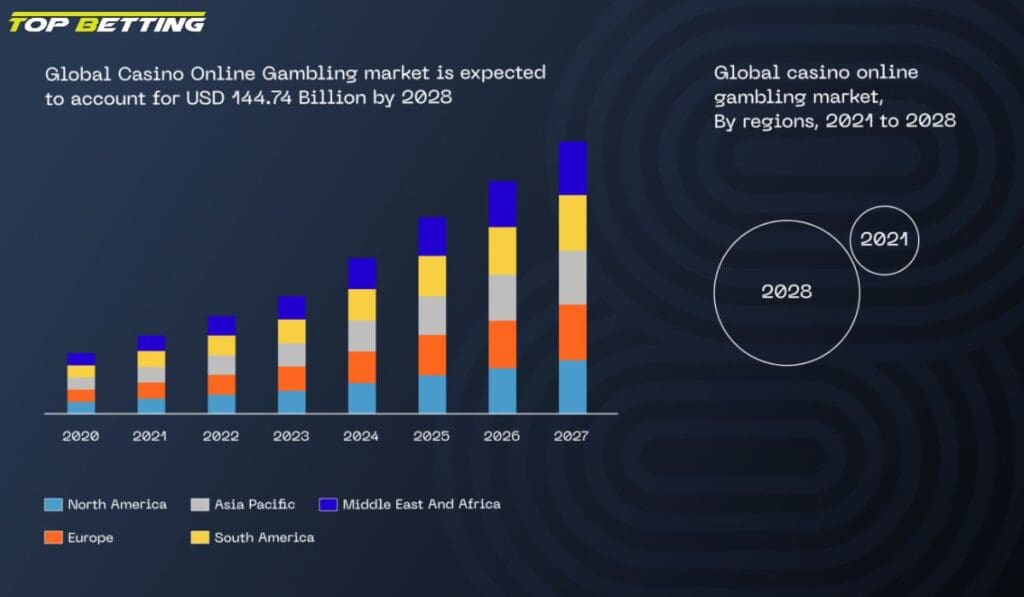
The Global Casino Market | A Lucrative Industry
Introduction
In the high-stakes world of entertainment and leisure, the global casino market reigns supreme as a lucrative industry that captivates millions of players worldwide. With its glitz, glamour, and infinite possibilities, casinos have become synonymous with excitement, making them a tempting playground for those seeking a thrilling experience.
As technology continues to advance, the casino industry has seamlessly merged the traditional brick-and-mortar establishments with online platforms, giving rise to a new era of gambling. This seamless integration has allowed players to enjoy their favorite casino games from the comfort of their homes, while also attracting a new generation of tech-savvy gamblers.
From the bustling Las Vegas strip to the lavish casinos of Macau, this multi-billion-dollar industry has created a global network of establishments that offer an array of games, entertainment, and dining options to cater to every taste and preference. From slot machines and poker tables to roulette wheels and blackjack, the casino market promises an adrenaline rush like no other.
The growth and size of the casino industry
The global casino market has experienced remarkable growth over the years, fueled by factors such as increasing disposable income, changing attitudes towards gambling, and the rise of tourism. According to industry reports, the market is projected to reach a value of USD 227.5 billion by 2023, with a compound annual growth rate (CAGR) of 5.5% from 2018 to 2023.
One of the key drivers of this growth is the expansion of legalized gambling in various countries. Previously restricted to a handful of locations such as Las Vegas and Monte Carlo, the casino industry has now spread its wings to include destinations like Macau, Singapore, and Australia. The growing acceptance of gambling as a form of entertainment has led to the establishment of new casinos and integrated resorts, attracting both domestic and international tourists.
Additionally, the advent of online casinos has contributed significantly to the industry’s growth. With the convenience of playing anytime, anywhere, online casinos have gained popularity among a wide range of players. The ease of access, coupled with a diverse selection of games and attractive bonuses, has made online gambling a preferred choice for many.

Key players in the global casino market
The global casino market is dominated by a few key players who have established themselves as industry leaders. These companies operate a wide range of casinos and resorts, offering a comprehensive entertainment experience for their patrons.
Las Vegas Sands Corp. is one of the largest casino operators in the world, with iconic properties such as The Venetian and The Palazzo in Las Vegas, as well as resorts in Macau and Singapore. The company has been at the forefront of the industry, pioneering the development of integrated resorts that combine casinos, hotels, shopping, and entertainment.
MGM Resorts International is another major player in the global casino market, with a portfolio of renowned properties including the MGM Grand, Bellagio, and Mandalay Bay in Las Vegas. The company has also expanded its presence internationally, with casinos in Macau and other destinations.
Other notable players in the industry include Wynn Resorts, Caesars Entertainment, and Galaxy Entertainment Group. These companies have established themselves as leaders in the casino market, constantly innovating and investing in new projects to stay ahead of the competition.
Trends and developments in the casino industry
The casino industry is constantly evolving, driven by changing consumer preferences and advancements in technology. One of the significant trends in recent years is the emphasis on experiential entertainment. Casinos are no longer just about gambling; they have transformed into entertainment hubs that offer a wide range of experiences beyond the gaming floor.
Integrated resorts have become increasingly popular, combining casinos with luxury hotels, shopping malls, theaters, and other entertainment options. These resorts aim to provide a complete entertainment experience, catering to both gamblers and non-gamblers alike. By diversifying their offerings, casinos can attract a broader customer base and increase revenue streams.
Another trend that has gained traction is the incorporation of technology in the casino industry. From virtual reality gaming to mobile betting apps, technology has revolutionized the way people gamble. Online casinos, in particular, have seen significant growth, driven by advancements in mobile technology and the increasing popularity of smartphones and tablets.
The impact of technology on the casino market
Technology has had a profound impact on the casino market, transforming the way people gamble and interact with casinos. Online casinos have revolutionized the industry by offering players the convenience of playing their favorite games from anywhere, at any time. This shift has not only attracted a new generation of players but also opened up new revenue streams for operators.
Mobile gaming has emerged as a major force in the casino industry, with the majority of players opting to play on their smartphones or tablets. Mobile casino apps have made it easier than ever to access a wide range of games, from slots to table games, with just a few taps on a screen. The convenience and portability offered by mobile gaming have contributed to its rapid growth and popularity.
In addition to online and mobile gambling, technology has also enhanced the gaming experience within physical casinos. Advanced slot machines, for example, now feature high-definition graphics, immersive sound effects, and interactive bonus rounds, creating a more engaging and entertaining experience for players. Virtual reality and augmented reality technologies are also being explored, promising to take the casino experience to new heights.
Casino market segmentation and target audience
The casino market caters to a diverse range of customers, each with unique needs and preferences. Understanding these segments and targeting them effectively is crucial for the success of any casino operator.
One of the primary segments in the casino market is the high-rollers or VIP players. These are individuals who are willing to spend large sums of money on gambling and expect exclusive treatment in return. High-rollers often receive perks such as luxurious accommodations, private gaming rooms, and personalized service to enhance their experience.
Casinos also target casual gamblers, who may visit the establishment for entertainment purposes rather than solely for gambling. These customers are attracted to the overall ambiance of the casino, including the quality of dining options, live entertainment, and other non-gaming amenities. Offering a diverse range of entertainment options is crucial to appeal to this segment.
Another segment that has gained prominence in recent years is the millennial demographic. Millennials are known for their affinity towards technology and their desire for unique experiences. Casinos have responded by incorporating interactive and immersive elements into their offerings, such as skill-based gaming and social gambling experiences. By catering to the preferences of millennials, casinos can attract a new generation of players and ensure their long-term sustainability.

Casino marketing strategies and promotions
Marketing plays a crucial role in the success of any casino. With intense competition in the industry, operators need to devise effective strategies to attract and retain customers.
One of the most common marketing tactics employed by casinos is the use of loyalty programs. These programs reward frequent players with various incentives, such as complimentary meals, hotel stays, and exclusive access to events. By offering these perks, casinos can encourage customer loyalty and increase repeat visits.
Promotions and special events are also essential in attracting new customers. Casinos often host tournaments, concerts, and other entertainment events to generate buzz and attract a wider audience. Special promotions, such as discounted room rates or free play vouchers, are also commonly used to entice new players to visit the casino.
In recent years, digital marketing has become increasingly important in the casino industry. Casinos leverage social media platforms, search engine marketing, and email campaigns to reach a wider audience and engage with customers. Online advertising and affiliate partnerships are also utilized to drive traffic to online casinos.
Challenges and opportunities in the casino market
While the casino market offers significant opportunities for growth, it is not without its challenges. One of the primary challenges faced by operators is the increasing regulation and scrutiny of the industry. Governments around the world are imposing stricter regulations on casinos to ensure responsible gambling and prevent money laundering. Compliance with these regulations can be costly and time-consuming for operators.
Another challenge is the evolving preferences of customers. The casino industry needs to continuously innovate and adapt to changing trends to stay relevant. Failure to do so can result in a decline in customer interest and revenue. Additionally, the rise of online gambling poses a threat to traditional brick-and-mortar casinos, requiring them to invest in online platforms or find ways to differentiate their offerings.
However, with challenges come opportunities. The expanding Asian market, particularly in countries like China and Japan, presents significant growth prospects for casino operators. These countries have a large population of potential gamblers who are increasingly embracing the casino experience.
Additionally, the integration of cryptocurrency into the casino market offers new opportunities for operators. Cryptocurrencies provide a secure and anonymous way for players to gamble online, eliminating the need for traditional payment methods. By accepting cryptocurrencies, casinos can attract a new segment of tech-savvy players and streamline their payment processes.
Regulatory and legal considerations in the global casino industry
The global casino industry operates in a complex regulatory environment, with each country having its own set of laws and regulations governing gambling activities. Compliance with these regulations is crucial for operators to maintain their licenses and ensure the integrity of their operations.
One of the key considerations for operators is responsible gambling. Casinos are required to implement measures to prevent problem gambling and protect vulnerable individuals. This includes providing information on responsible gambling, offering self-exclusion programs, and training staff to identify and assist problem gamblers.
Money laundering is another significant concern in the casino industry. Casinos are required to have robust anti-money laundering (AML) procedures in place to detect and report suspicious transactions. This involves implementing stringent customer due diligence measures, conducting regular audits, and cooperating with regulatory authorities.
Additionally, taxation is an important consideration for casino operators. Governments impose various taxes on gambling activities, including gaming taxes, corporate income taxes, and indirect taxes on non-gaming revenue. Understanding the tax implications and planning accordingly is crucial for operators to ensure profitability.

Conclusion: The future of the casino market
The global casino market shows no signs of slowing down, with continued growth expected in the coming years. The integration of technology, the expansion of legalized gambling, and the evolving preferences of customers will shape the future of the industry.
As technology continues to advance, online gambling is likely to become even more prevalent, catering to the growing demand for convenience and accessibility. Virtual reality and augmented reality technologies have the potential to revolutionize the casino experience, creating immersive and interactive environments for players.
The expansion of the Asian market presents significant opportunities for casino operators, with countries like China and Japan poised to become major players in the industry. The integration of cryptocurrency offers new possibilities for operators to attract a new segment of players and streamline their operations.

However, the casino industry also faces challenges, including increasing regulation, evolving customer preferences, and competition from online gambling. Operators need to adapt and innovate to stay ahead in this dynamic and highly competitive market.
In conclusion, the global casino market is a thriving industry that offers lucrative opportunities for operators. With its glitz, glamour, and endless possibilities, it continues to captivate players worldwide. As the industry evolves and embraces technology, the future of the casino market is set to be even more exhilarating and rewarding.











